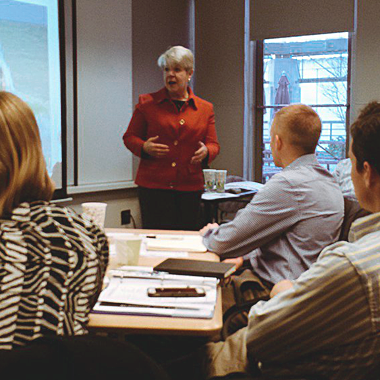
Throughout National Ethics Awareness Month, ICMA encourages local government leaders to develop strategies that strengthen ethical behavior within their organizations. As we come to the end of the month, Martha Perego, ICMA director of Ethics and Membership, took some time to explain how the ICMA Code of Ethics relates to students and early-career professionals in a discussion about “Ethics in the Real World.” Her answers help clarify and illuminate the ways the Code of Ethics is relevant and important for everyone interested in professional local government service.
Ethics=Leadership
The Code of Ethics is a set of standards, 12 Tenets with Guidelines, that ICMA members pledge to uphold in their conduct and decisions to earn the trust of the public, elected officials, and staff they serve. Throughout her discussion, Martha emphasizes that ethics is about something larger than the principals outlined in the Code. As Martha explains, “Ethics is really about leadership. It’s about values. How do you implement those values in the work that you do? I think a lot of times people think of ethics like they are the 10 Commandments. It’s truly not. It’s about leadership and values and making sure you are a good leader.”
It's about the People
Martha reflects on what she wished she had known about ethics early in her career. Like many early-career professionals, Martha was very focused on being technically competent and advancing her career. She wishes that she had spent a bit more time thinking about how she treated people and making the connections between ethics and leadership. Being a great leader is about focusing on your values, being consistent, being authentic, and making sure that you are not putting your own self-interest first. Highlighting the importance of the public trust, personal and professional integrity, and commitment, Martha reminds us "The Code of Ethics defines the profession and ties us all together in how we serve the people in a democracy."
THE VALUES APPLY TO EVERYONE
When asked whether the Code of Ethics is manager-focused, Martha stated, “I would actually acknowledge that with regards to some of the guidelines, but I think the values apply to everybody. You’re thinking about the dignity and worth of services rendered by a government, and how do we maintain trust and confidence, and how do we make sure that we, as staff, are doing what we’re supposed to do to implement the policies that have been approved by elected officials.” Even early in your career, the choices you make, what you say and do, can reflect directly on your organization.
Entering the profession
Explaining why ICMA membership and adherence to the Code are important to those just entering the profession, Martha states, “You can hire anybody to do practically any job and they might be technically competent, but do they understand the environment where they are working and have they committed to the highest standards? That is what the ICMA Code of Ethics does, it says I am willing to adhere to the highest level of ethical standards. I care about ethics, I may not always agree with the ICMA Code, but I stop and think what I am doing and use that is a reference and a framework." The Code of Ethics that hangs on the manager's wall is not for show, it is what distinguishes them as professionals, committed to serving the public, their staff, and the elected officials with the highest level of integrity and honor.
The Future of the code
The ICMA Code of Ethics has been amended 8 times in 92 years, which is a testament to the constant, consistent, and relevant values of the Code. Nevertheless, the Code is actually a dynamic document. Starting in 2013, ICMA’s membership has been examining one or two of the Code’s 12 tenets each year. ICMA engages members at every level of the process.
Members have revised and clarified Guidelines and replaced Tenet 12's outdated language to now read, "Public office is a public trust. A member shall not leverage his or her position for personal gain or benefit."
As ICMA launches a review of Tenet 3, the growth and use of social media will be adressed. As Martha explains, "The issue for ICMA will be how do you give some really good guidance on social media that reflect its value as a tool, but also how do you not make it just about don’t say something stupid on twitter. Control your impulses and things like that. But we will be addressing the use of social media."
Interested in learning about "Tenet 13," "liking" a restaurant in your community, Martha's first "big" ethical challenge, or what's on her bookcase? You can read more and listen to the call "Ethics in the Real World" here.
New, Reduced Membership Dues
A new, reduced dues rate is available for CAOs/ACAOs, along with additional discounts for those in smaller communities, has been implemented. Learn more and be sure to join or renew today!
